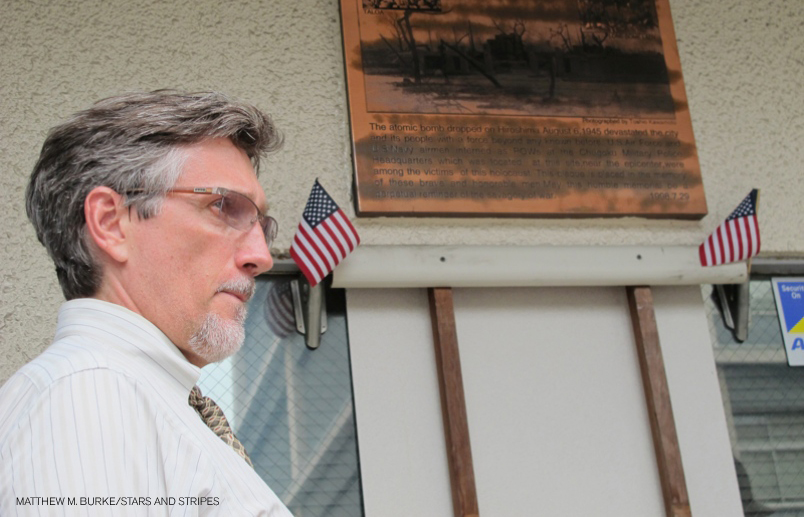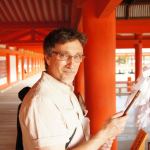TRU View | August 5, 2015

70 Years Later
President Truman’s eldest grandson reflects on the 70th anniversary of the bombing of Hiroshima.
Contributed by Clifton Truman Daniel
Over the years, I have met dozens of World War II veterans who shake my hand and tell me that if my grandfather hadn’t ordered the use of atomic bombs against Japan, they would likely have died in an invasion of the country’s home islands.
I also have friends who have suffered terribly because of my grandfather’s decision. They are survivors of Hiroshima and Nagasaki.
On this, the 70th anniversary of the bombings, we honor both.
In 1947, on a state visit to Mexico, my grandfather laid a wreath at the monument to Los Niños Heroes, six teenage Mexican Army cadets who died defending their military academy against American forces 100 years earlier. When reporters asked him why he had honored former enemies, my grandfather said, “Brave men don’t belong to any one country. I respect bravery wherever I see it.”
Likewise, suffering and sacrifice don’t belong to any one country. We must acknowledge it fully and honestly to move forward in peace.
Fred Mitchell barely escaped as kamikazes destroyed his ship, the USS Drexler, and killed most of his friends. For decades afterward, he harbored a deep hatred for the Japanese. Finally, unable to tolerate the poison anymore, he traveled to Japan and met – and befriended – some of the men who had been trained to kill him.
“Looking at these old Japanese men who didn’t look much different from me … it was just so hard to believe that we were trying to kill each other,” he said. “They were of the same mind as we were. There comes a time to end the hatred.”
My friendship with survivors began with a little girl named Sadako Sasaki.
Sadako was two when the first atomic bomb destroyed her hometown, Hiroshima, in 1945. She and her family survived. Nine years later, Sadako was diagnosed with radiation-induced leukemia. To help in her treatment, she followed a Japanese tradition that says if you fold 1,000 origami paper cranes, you are granted a long life and good health.
Sadako folded about 1,500 cranes, but died of the leukemia in October of 1955. A monument to her and to all the children killed, wounded or sickened by the bomb stands in Hiroshima’s Peace Memorial Park today.
Sadako wanted to live her life in a world free of war and nuclear weapons. Though she has been immortalized in books and on film, not many of her own words remain. Those that do are simple, heartfelt and should be a guide for the rest of us on this 70th anniversary of the end of the war and the first and only use of nuclear weapons against human beings.
“I will write peace on your wings,” she said off her flock of paper cranes. “And you will fly all over the world.”
Editor’s Note: Visit the Truman Library to view one of the last origami cranes folded by Sadako.
 Clifton Truman Daniel is the eldest grandson of former U.S. President Harry S. Truman and son of the late E. Clifton Daniel Jr., former managing editor of the New York Times, and best-selling mystery writer Margaret Truman. Mr. Daniel is the honorary chairman of the Board of Trustees of the Truman Library Institute, the nonprofit partner of the Harry S. Truman Library and Museum. He is a frequent speaker and fundraiser and the author of the 1995 memoir, Growing Up With My Grandfather: Memories of Harry S. Truman, and Dear Harry, Love Bess: Bess Truman’s Letters to Harry Truman, 1919-1843, published in 2011.
Clifton Truman Daniel is the eldest grandson of former U.S. President Harry S. Truman and son of the late E. Clifton Daniel Jr., former managing editor of the New York Times, and best-selling mystery writer Margaret Truman. Mr. Daniel is the honorary chairman of the Board of Trustees of the Truman Library Institute, the nonprofit partner of the Harry S. Truman Library and Museum. He is a frequent speaker and fundraiser and the author of the 1995 memoir, Growing Up With My Grandfather: Memories of Harry S. Truman, and Dear Harry, Love Bess: Bess Truman’s Letters to Harry Truman, 1919-1843, published in 2011.


